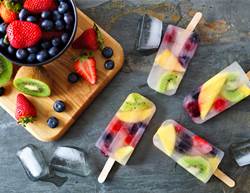The concept of food as medicine has been around for thousands of years, but science is still exploring the evidence. What we do know is that some eating patterns, specifically mostly plant-based with a focus on minimally processed foods, are associated with longevity and a lowered risk of chronic disease such as type 2 diabetes, heart disease and certain cancers.
There’s also good evidence that people can support their immune system by eating a gut-friendly, fibre-rich diet, including a wide variety of fruit and veg, probiotic fermented foods, healthy fats and oily fish, and minimising your alcohol, sugar and salt intake. Unfortunately, voices on the internet often put specific ‘super’ foods, like goji berries and coconut oil, on a wellness pedestal and loudly proclaim they’re an antidote to almost any ailment.
But we certainly can’t dismiss the idea that food and health are connected. Instead of treating food as a quick-fix miracle drug, think of eating healthily as a preventative ‘medicine’ that just happens to taste a whole lot better than any pill.
Here are just some examples of how what you eat can play a role in improving how you feel.
THE PROBLEM: A runny nose
YOU SHOULD HAVE MORE...citrus fruits
Vitamin C is most commonly suggested for preventing the common cold, but research shows it’s more useful in helping you recover from viruses faster. So, load up on oranges, mandarins, berries and kiwifruit, too. What about garlic, you ask? Garlic has well-documented antibacterial and antiviral properties, but there are few trials on its effect on colds. One study with 146 participants found that people who ate garlic every day for three months had fewer colds than the group taking a placebo. When they had a cold, however, the length of illness was similar in both groups.
WHEN IT HITS HARD, TRY… chicken soup
Unfortunately, if you’ve already succumbed to the dreaded lurgy, there’s not too much you can do except stay home and wait it out. However, Mother Nature has a few fast recovery tricks that can help you feel better. When you’re sick, fluids are the most important, especially if you have a fever, as you’re more prone to dehydration. Sipping fluids helps keep the lining of your nose and throat passages moist and the mucus soft. Warm fluids, such as soup or hot water with lemon and honey, can help to clear nasal passages and may soothe a sore throat. Indeed, studies have found chicken soup to be anti-inflammatory. Not much else has emerged since then, but at the very least it’ll be good for the soul.
THE PROBLEM: Bloating
YOU SHOULD HAVE MORE…yoghurt
Probiotics are microorganisms (bacteria) that, in large amounts, can provide big health benefits for your body. They’re the ‘good’ bacteria that live in your intestines, fighting ‘bad’ bacteria that cause illness. Yoghurt contains friendly bacteria that’s gentle on your tummy, and some people may find probiotics helpful for bloating and other uncomfortable gut symptoms. Fermented foods, such as sauerkraut, kefir and kimchi, are also good sources of probiotics.
TRY TO LIMIT… salt
Salt is a well-known culprit of fluid retention, as excess salt prompts your kidneys to hold onto water instead of excreting it – making you up to two kilos heavier. For women, reducing salt intake may also diminish PMS-related bloating and fluid retention.
THE PROBLEM: Exhaustion or fatigue
YOU SHOULD HAVE MORE…bananas
There are plenty of good reasons why bananas are called nature’s energy snack. One medium banana provides about 15 per cent of your daily vitamin B6 needs for nerve function, plus the natural carbs and potassium provide long-lasting energy and will help stimulate bored brains. They make the ideal mid-afternoon snack to battle 3.30-itis and they’re filling enough to see you through to dinner, thanks to a satisfying 2–3g of fibre.
TRY TO AVOID… sweet biscuits
It’s easy to reach for something sweet, especially when you’re tired and can’t be bothered preparing a healthy snack, but all that sugar will leave you experiencing an energy slump. The sugar in lollies, chocolate and refined cakes and biscuits is digested quickly, which means you receive a short energy spike, followed by a sharp dip in your blood sugar levels that leaves you feeling fatigued.
THE PROBLEM: Cramps
YOU SHOULD HAVE MORE…leafy greens
Muscle overuse and muscle fatigue tend to cause cramps, but what you eat can make a difference. Magnesium may be beneficial in reducing the severity of muscle cramps. While magnesium supplements offer the daily recommended intake of 400mg for men and 320mg for women in one quick hit, magnesium is found widely in plant foods, specifically dark leafy greens, seeds, nuts, legumes and cereals. So, with a varied diet, it’s easy to meet your target. Upping your intake of calcium and potassium may help even more.
AND DON’T FORGET…water
Another common reason for muscular cramps is dehydration. Muscles need fluid to help them contract and relax, so if you’re suffering from cramps regularly, drink plenty of fluid before, during and after exercise to minimise your risk of dehydration – especially as the temperature heats up.
THE PROBLEM: Dry skin or hair
YOU SHOULD HAVE MORE…oily fish
The body needs fat to function at its best. Not the greasy pastry and pie type, but the essential omega-3 and omega-6 fats. They’re called ‘essential’ fats because the body can’t make them; you have to eat them. If you have a dry, itchy scalp or skin, you may not be eating enough of these healthy fats. Both omega-3 and omega-6 fats produce hormone-like substances called prostaglandins, which then change into other substances that affect immunity and inflammation in the body. For healthy skin, you need a balance of both types of fat, but a typical Western diet tends to have a higher ratio of omega-6 to omega-3 than ideal. Eating a few serves of oily fish a week, such as fresh or canned salmon, sardines and tuna, increases omega-3s for a better balance.
SNACK ON…nuts
A daily handful of nuts has benefits for your skin, hair, heart and brain. In a nutshell, they’re a good source of healthy fats, protein, vitamin E and B vitamins. Vitamin E is especially beneficial to protect the skin from inflammation and sun damage, and naturally helps combat dry skin. Walnuts are particularly rich in omega-3 fats, so snack on a handful daily to show your skin some love.
THE PROBLEM: PMS
YOU SHOULD HAVE MORE…wholegrain cereal
Women with premenstrual syndrome (PMS) are hypersensitive to their hormonal fluctuations during their menstrual cycle. It’s believed PMS is caused by increasing levels of the hormone progesterone, provoking chemical messengers in the brain (called neurotransmitters). Many vitamins, minerals and essential fatty acids are involved in this process, which is why making dietary changes may help you out. A diet rich in foods containing thiamine and riboflavin has been found to decrease PMS, so eat plenty of wholegrain cereals, milk and legumes. Calcium and vitamin D can also benefit, so include two to three serves of dairy, such as milk, yoghurt or cheese, every day.
THROUGHOUT…limit sugar and caffeine
Although you may crave sugar, coffee or alcohol, research suggests these can actually make PMS worse, so reduce your intake. Too much caffeine can cause poor sleep, irritability and menstrual cramps.
THE PROBLEM: Constipation
YOU SHOULD HAVE MORE…kiwifruit
The humble kiwifruit has a double benefit for gut health. It contains a good amount of fibre (about 2g per fruit), which absorbs fluid into your bowel to keep your stools soft and easy to pass. In order to keep your bowels regular, you need a range of both soluble and insoluble fibre. Load up on other fibre-rich foods, too, such as berries, oats, chia seeds, sweet potatoes, lentils and wholegrain bread. As well as fibre, kiwifruit has an enzyme called actinidin that helps break down protein and improve digestion, which might be why it’s the basis for some gut health supplements and products. Snack on a few kiwifruits daily to ease constipation.
AND DON’T FORGET TO…drink more water
When you’re adding extra fibre, it’s important to increase your fluid intake, too, or you might end up causing more issues. Try to drink about 2L of water a day. Keep an eye on your wee; if it’s a pale straw colour, you’re well hydrated.
THE PROBLEM: Menopause Symptoms
YOU SHOULD HAVE MORE…tofu
Soy foods are phytoestrogens – a plant-based oestrogen that mimics the role of natural oestrogen in your body. For one in three women, eating phytoestrogen-rich foods (think soy milk, tofu, tempeh and soy-linseed bread) may help ease menopausal symptoms. Many people mistakenly believe that consuming soy foods can have harmful effects on their hormonal health, however the research overall has shown that eating whole soy foods, such as tofu and tempeh, in amounts similar to traditional Asian diets, is safe – and can even help reduce your risk of developing breast cancer as well as some other cancers.
AS WELL AS… oily fish
Research also suggests that omega-3s can help ease depressive symptoms associated with the menopausal transition. Don’t forget that it doesn’t have to be fresh seafood – canned salmon and sardines are also high in omega-3 fats. Hot flushes are the most common sign of menopause. There are quite a few things in your diet that could set off a hot flush, such as spicy foods, caffeine and alcohol, so try to cut down on these.
THE PROBLEM: Insomnia
YOU SHOULD HAVE MORE…chamomile tea
Reach for a soothing tea when you can’t seem to switch off at night. Chamomile tea has been used in traditional medicine for centuries to treat a range of sleep ailments, such as insomnia. The plant extract contains apigenin, a chemical compound that binds to the same receptors in the brain as benzodiazepines (drugs used to treat anxiety and insomnia), producing a sedative effect. Studies have shown chamomile, consumed in the form of an extract or a tea, leads to significant improvement in sleep quality.
BEFORE YOU GO TO BED…drink a cup of warm cocoa
You might have been given a cup of warm milk before bed as a child to help you sleep, and there’s some truth behind the popular bedtime drink. Milk is a source of the essential amino acid tryptophan, which your body needs to produce compounds, including serotonin and melatonin, in the brain. These compounds are involved in the sleep-wake cycle, which could explain why milk helps you sleep better. Adding antioxidant-rich cocoa to your warm milk may have additional benefits – not to mention it tastes good! Cocoa is associated with a reduction in blood pressure (in healthy people and those with high blood pressure). This lowering of blood pressure, which relaxes the smooth muscles that line your arteries, could produce a calming effect, making it easier to nod off.










